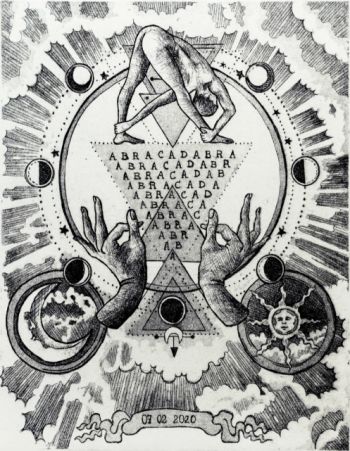Difference between revisions of "Abracadabra & Abraxas"
Tao alexis (talk | contribs) (Created page with "'''Abraxas''' is a word whose letters, when written in Greek and read as numbers, make up 365. It was written on stones used as charms. As a name, Abraxas was used by the Ba...") |
Tao alexis (talk | contribs) |
||
| Line 1: | Line 1: | ||
| + | [[File:Abracadabra.jpg|right|350px|thumb|]] | ||
'''Abraxas''' is a word whose letters, when written in Greek and read as numbers, make up 365. It was written on stones used as charms. As a name, Abraxas was used by the Basilidian Gnostics for a god, regarded as supreme, whose emanations were numbered 365 heavens. | '''Abraxas''' is a word whose letters, when written in Greek and read as numbers, make up 365. It was written on stones used as charms. As a name, Abraxas was used by the Basilidian Gnostics for a god, regarded as supreme, whose emanations were numbered 365 heavens. | ||
Latest revision as of 16:04, 20 April 2023
Abraxas is a word whose letters, when written in Greek and read as numbers, make up 365. It was written on stones used as charms. As a name, Abraxas was used by the Basilidian Gnostics for a god, regarded as supreme, whose emanations were numbered 365 heavens.
Abracadabra, like Abraxas, is a word found inscribed on stones which were worn as amulets or charms against evil. The Basilidian Gnostics (Basilides flourished c. 120-140) employed it as a magical formula to invoke the help of beneficent spirits against misfortune and disease. The formula was usually arranged in a triangle formed by writing the word eleven times, once completely and then shortened each time by a letter. The word is applied contemptuously to superficial solutions, which attempt to dismiss complicated or insoluble problems.
An amulet so inscribed properly, warded off lethal diseases, and was able to stave off misfortune, or so it was believed.
